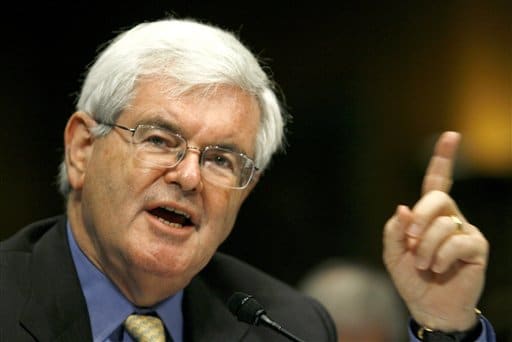After smashing Mitt Romney in the South Carolina primary, former House speaker Newt Gingrich has now emerged as tied with the onetime Republican presidential frontrunner. So it’s time to look closely at Gingrich’s record on science—which is not, perhaps, as dismal as Rick Santorum’s, but still gives ample cause for concern.
When it comes to Newt on science, we’re presented with a complex picture. Gingrich holds a Ph.D. in history, which suggests that he might be considered a scholar and intellectual. And he professes to love science and technology. Ten years ago in 2002, he called for tripling the budget of the National Science Foundation, a goal I heartily endorse.
And yet…here are no less than four issues where Gingrich’s science record raises serious concern:
The Undermining of Science Advice. In 1995, Gingrich-led congressional Republicans did away with the Office of Technology Assessment (OTA), which had previously served as their in-house source of science advice. As I reported in my book The Republican War on Science, Gingrich instead espoused a “free market” approach to scientific expertise: Rather than having institutional science advice in place, members of Congress could just meet with scientists as they saw fit in order to inform themselves.
Is this a good idea? My book included this quote from Robert Palmer, a longtime Democratic staffer on the House Science Committee: “Gingrich’s view was always, ‘I’ll set up one-on-one interactions between members of Congress and key members of the scientific community. Which I thought was completely bizarre. I mean, who comes up with these people, and who decides they’re experts, and what member of Congress really wants to do that?”
One of the pathologies of American politics today is our unending “my expert versus your expert” games. If you don’t want to believe in global warming, then hey, just find yourself a scientist who says it’s not caused by humans. There are plenty of them around, after all. That this strategy is considered acceptable is attributable, at least partly, to Gingrich-style political thinking. And sure enough, as I went on to report in Republican War, once Gingrich and his allies got rid of OTA they proceeded to hold hearings to attack mainstream science on global warming, ozone depletion, and other issues.
Evolution. I personally doubt that Newt Gingrich, a Catholic, denies evolution. However, he’s certainly willing to pander to the Christian Right on the matter. In a recent video captured by Think Progress, he could be found uttering the following: “I always tell my friends who don’t believe in [God], fine, how do you think — we’re randomly gathered protoplasm? We could have been rhinoceroses, but we got lucky this week?” Calling evolution by natural selection “random” is a well known creationist talking point. See here for a rebuttal.
Stem Cells. In the same video, Gingrich dramatically distorted stem cell science. In a bout of truly irresponsible rhetoric, he likened embryonic stem cell research to “killing children”—it is nothing of the sort—and called so-called adult stem cells “regular stem cells,” as if embryonic ones are somehow irregular. The scientific consensus is that research on both types of stem cells is important.
Global Warming. Gingrich wrote an entire book espousing his own particular form of free market environmentalism. In a now infamous video with Nancy Pelosi, meanwhile, he stated that “our country must take action to address climate change.” But Gingrich later flip flopped and claimed not to support cap and trade—and he also seems to have flip flopped on the core question of whether global warming is caused by humans. For a full overview of Gingrich’s changing views on climate change and what to do about it, see here.
In other words, much like Mitt Romney, Gingrich comes across as a politician who will contradict his previous views—or utter anti-science things—because it is politically expedient. It’s hard to believe, at least for me, that Gingrich actually doubts evolution, or that he really doubts that global warming is caused by humans. But at minimum, he’s out there playing politics on both topics and scoring points.
This stance itself links back to Gingrich’s “free market” views of scientific expertise. If you’re not bound by what the consensus of experts say—if you’re free to go shopping for science, to pick-and-choose—then it certainly becomes easier to find convenient support for the opinion or view that you need to “have” in a particular moment.
In sum, then, Gingrich is no Rick Santorum—no ardent science denier. But on the other hand, his apparent cynicism in the handling of scientific knowledge is disturbing enough.
Subscribe to our newsletter
Stay up to date with DeSmog news and alerts







